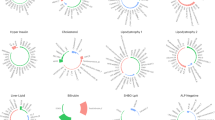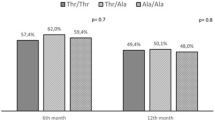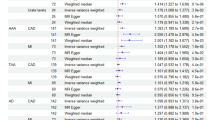Abstract
Epidemiological studies show that type 2 diabetes (T2D) is inversely associated with intracranial aneurysms (IA) and abdominal aortic aneurysms (AAA). Although adiposity has not been considered a risk factor for IA, there have been inconsistent reports relating adiposity to AAA risk. We assessed whether these observations have a genetic, causal basis. To this end, we extracted genotypes of validated single-nucleotide polymorphisms associated with T2D (n=65), body mass index (BMI) (n=97) and waist–hip ratio adjusted for BMI (WHRadjBMI) (n=47) from genotype data collected in 717 IA cases and 1988 controls, and in 818 AAA cases and 3004 controls, all of Dutch descent. For each of these three traits, we computed genetic risk scores (GRS) for each individual in these case–control data sets by summing the number of risk alleles weighted by their published effect size, and tested whether these GRS were associated with risk of aneurysm. We divided the cohorts into GRS quartiles, and compared IA and AAA risk in the highest with the lowest GRS quartile using logistic regression. We found no evidence for association in IA or AAA risk between top and bottom quartiles for the genetic risk scores for T2D, BMI and WHRadjBMI. However, additional Mendelian randomization analyses suggested a trend to potentially causal associations between BMI and WHRadjBMI and risk of AAA. Overall, our results do not support epidemiological observations relating T2D to aneurysm risk, but may indicate a potential role of adiposity in AAA that requires further investigation.
Similar content being viewed by others
Log in or create a free account to read this content
Gain free access to this article, as well as selected content from this journal and more on nature.com
or
References
van't Hof FN, Ruigrok YM, Baas AF et al: Impact of inherited genetic variants associated with lipid profile, hypertension, and coronary artery disease on the risk of intracranial and abdominal aortic aneurysms. Circ Cardiovasc Genet 2013; 6: 264–270.
Feigin VL, Rinkel GJ, Lawes CM et al: Risk factors for subarachnoid hemorrhage: an updated systematic review of epidemiological studies. Stroke 2005; 36: 2773–2780.
Forsdahl SH, Singh K, Solberg S, Jacobsen BK : Risk factors for abdominal aortic aneurysms: a 7-year prospective study: the Tromso Study, 1994–2001. Circulation 2009; 119: 2202–2208.
Cornuz J, Sidoti Pinto C, Tevaearai H, Egger M : Risk factors for asymptomatic abdominal aortic aneurysm: systematic review and meta-analysis of population-based screening studies. Eur J Public Health 2004; 14: 343–349.
Inagawa T : Risk factors for aneurysmal subarachnoid hemorrhage in patients in Izumo City, Japan. J Neurosurg 2005; 102: 60–67.
Shah AD, Langenberg C, Rapsomaniki E et al: Type 2 diabetes and incidence of cardiovascular diseases: a cohort study in 1.9 million people. Lancet Diabetes Endocrinol 2015; 3: 105–113.
Ohrlander T, Merlo J, Ohlsson H, Sonesson B, Acosta S : Socioeconomic position, comorbidity, and mortality in aortic aneurysms: a 13-year prospective cohort study. Ann Vasc Surg 2012; 26: 312–321.
Shantikumar S, Ajjan R, Porter KE, Scott DJ : Diabetes and the abdominal aortic aneurysm. Eur J Vasc Endovasc Surg 2010; 39: 200–207.
Vlak MH, Rinkel GJ, Greebe P, Algra A : Independent risk factors for intracranial aneurysms and their joint effect: a case-control study. Stroke 2013; 44: 984–987.
Kent KC, Zwolak RM, Egorova NN et al: Analysis of risk factors for abdominal aortic aneurysm in a cohort of more than 3 million individuals. J Vasc Surg 2010; 52: 539–548.
Stackelberg O, Bjorck M, Sadr-Azodi O, Larsson SC, Orsini N, Wolk A : Obesity and abdominal aortic aneurysm. Br J Surg 2013; 100: 360–366.
Bilguvar K, Yasuno K, Niemela M et al: Susceptibility loci for intracranial aneurysm in European and Japanese populations. Nat Genet 2008; 40: 1472–1477.
Kiemeney LA, Thorlacius S, Sulem P et al: Sequence variant on 8q24 confers susceptibility to urinary bladder cancer. Nat Genet 2008; 40: 1307–1312.
Wetzels JF, Kiemeney LA, Swinkels DW, Willems HL, den Heijer M : Age- and gender-specific reference values of estimated GFR in Caucasians: the Nijmegen Biomedical Study. Kidney Int 2007; 72: 632–637.
Gretarsdottir S, Baas AF, Thorleifsson G et al: Genome-wide association study identifies a sequence variant within the DAB2IP gene conferring susceptibility to abdominal aortic aneurysm. Nat Genet 2010; 42: 692–697.
Helgadottir A, Thorleifsson G, Magnusson KP et al: The same sequence variant on 9p21 associates with myocardial infarction, abdominal aortic aneurysm and intracranial aneurysm. Nat Genet 2008; 40: 217–224.
Hofman A, van Duijn CM, Franco OH et al: The Rotterdam Study: 2012 objectives and design update. Eur J Epidemiol 2011; 26: 657–686.
Howie B, Marchini J, Stephens M : Genotype imputation with thousands of genomes. G3 (Bethesda) 2011; 1: 457–470.
Delaneau O, Marchini J, Zagury JF : A linear complexity phasing method for thousands of genomes. Nat Methods 2012; 9: 179–181.
Abecasis GR, Altshuler D, Auton A et al: A map of human genome variation from population-scale sequencing. Nature 2010; 467: 1061–1073.
Purcell S, Neale B, Todd-Brown K et al: PLINK: a tool set for whole-genome association and population-based linkage analyses. Am J Hum Genet 2007; 81: 559–575.
Morris AP, Voight BF, Teslovich TM et al: Large-scale association analysis provides insights into the genetic architecture and pathophysiology of type 2 diabetes. Nat Genet 2012; 44: 981–990.
Locke AE, Kahali B, Berndt SI et al: Genetic studies of body mass index yield new insights for obesity biology. Nature 2015; 518: 197–206.
Shungin D, Winkler TW, Croteau-Chonka DC et al: New genetic loci link adipose and insulin biology to body fat distribution. Nature 2015; 518: 187–196.
Smith GD, Ebrahim S : 'Mendelian randomization': can genetic epidemiology contribute to understanding environmental determinants of disease? Int J Epidemiol 2003; 32: 1–22.
Bowden J, Davey Smith G, Burgess S : Mendelian randomization with invalid instruments: effect estimation and bias detection through Egger regression. Int J Epidemiol 2015; 44: 512–525.
Bowden J, Davey Smith G, Haycock PC, Burgess S : Consistent estimation in Mendelian randomization with some invalid instruments using a weighted median estimator. Genet Epidemiol 2016; 40: 304–314.
Bowden J, Del Greco MF, Minelli C, Davey Smith G, Sheehan NA, Thompson JR : Assessing the suitability of summary data for two-sample Mendelian randomization analyses using MR-Egger regression: the role of the I2 statistic. Int J Epidemiol 2016, pii dyw220.
Nordon IM, Hinchliffe RJ, Loftus IM, Thompson MM : Pathophysiology and epidemiology of abdominal aortic aneurysms. Nat Rev Cardiol 2011; 8: 92–102.
Rodin MB, Daviglus ML, Wong GC et al: Middle age cardiovascular risk factors and abdominal aortic aneurysm in older age. Hypertension 2003; 42: 61–68.
Heid IM, Jackson AU, Randall JC et al: Meta-analysis identifies 13 new loci associated with waist-hip ratio and reveals sexual dimorphism in the genetic basis of fat distribution. Nat Genet 2010; 42: 949–960.
Aschard H, Vilhjálmsson BJ, Joshi AD, Price AL, Kraft P : Adjusting for heritable covariates can bias effect estimates in genome-wide association studies. Am J Hum Genet 2015; 96: 329–339.
Burgess S, Thompson SG : Multivariable Mendelian randomization: the use of pleiotropic genetic variants to estimate causal effects. Am J Epidemiol 2015; 181: 251–260.
Smith GD, Lawlor DA, Harbord R, Timpson N, Day I, Ebrahim S : Clustered environments and randomized genes: a fundamental distinction between conventional and genetic epidemiology. PLoS Med 2007; 4: e352.
Acknowledgements
FNGVH is supported by a grant of the Dutch Heart Foundation (NHS) (project no. 2008B004). JV works for the CoLaus|PsyCoLaus study which was and is supported by research grants from GlaxoSmithKline, the Faculty of Biology and Medicine of Lausanne, and the Swiss National Science Foundation (grants 3200B0-105993, 3200B0-118308, 33CSCO-122661, 33CS30-139468 and 33CS30-148401). YMR is supported by a clinical fellowship grant of the Netherlands Organization for Scientific Research (NWO) (project no. 40-00703-98-13533). AFB is supported by a grant from the Dr E Dekker Program of the NHS (2009T001). The generation of the GWAS data sets is supported by the Netherlands Organisation for Scientific Research NWO Investments (no. 175.010.2005.011, 911-03-012), the Genetic Laboratory of the Department of Internal Medicine, Erasmus MC, the Research Institute for Diseases in the Elderly (014-93-015; RIDE2), the Netherlands Genomics Initiative (NGI)/Netherlands Organisation for Scientific Research (NWO) Netherlands Consortium for Healthy Aging (NCHA), project no. 050-060-810. The Rotterdam Study is funded by the Erasmus Medical Center and Erasmus University, Rotterdam, Netherlands Organization for Health Research and Development (ZonMw), the Research Institute for Diseases in the Elderly (RIDE), the Ministry of Education, Culture and Science, the Ministry of Health, Welfare and Sport, the European Commission (DG XII) and the Municipality of Rotterdam.
Author information
Authors and Affiliations
Corresponding author
Ethics declarations
Competing interests
The authors declare no conflict of interest.
Additional information
Supplementary Information accompanies this paper on European Journal of Human Genetics website
Supplementary information
Rights and permissions
About this article
Cite this article
van 't Hof, F., Vaucher, J., Holmes, M. et al. Genetic variants associated with type 2 diabetes and adiposity and risk of intracranial and abdominal aortic aneurysms. Eur J Hum Genet 25, 758–762 (2017). https://doi.org/10.1038/ejhg.2017.48
Received:
Revised:
Accepted:
Published:
Issue date:
DOI: https://doi.org/10.1038/ejhg.2017.48
This article is cited by
-
Type 2 diabetes has a protective causal association with thoracic aortic aneurysm: a Mendelian randomization study
Diabetology & Metabolic Syndrome (2023)
-
A two-sample Mendelian randomization analysis of modifiable risk factors and intracranial aneurysms
Scientific Reports (2022)
-
Causal role of high body mass index in multiple chronic diseases: a systematic review and meta-analysis of Mendelian randomization studies
BMC Medicine (2021)
-
Evaluating marginal genetic correlation of associated loci for complex diseases and traits between European and East Asian populations
Human Genetics (2021)



